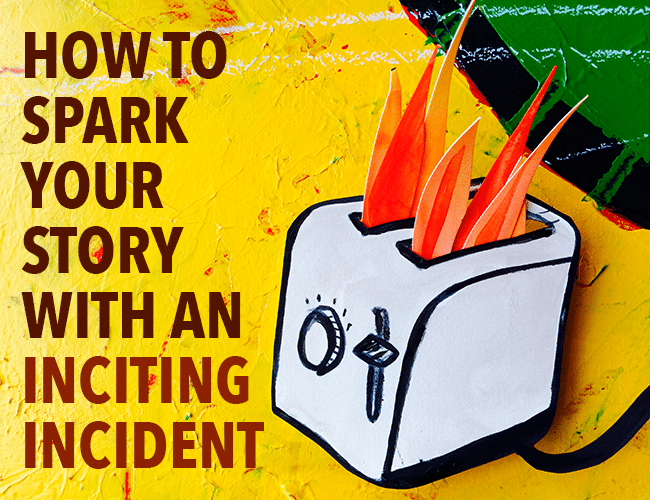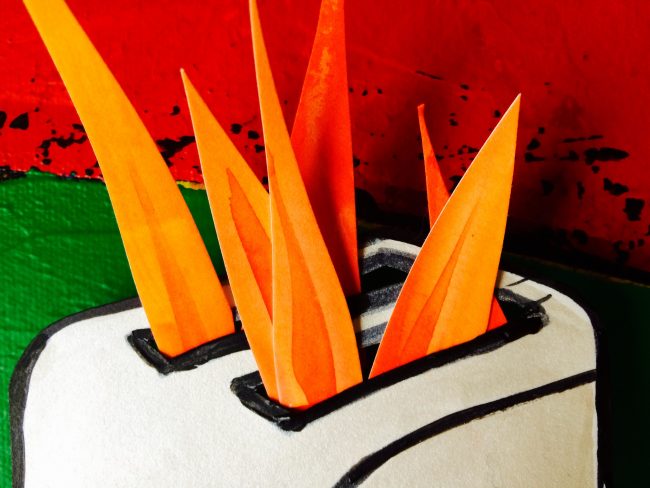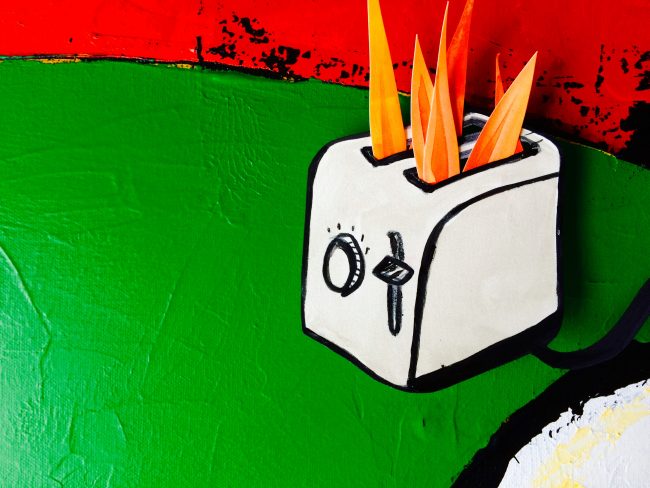If you are planning on writing a story, there is something you need to consider besides basic plot structure. You need to determine your Inciting Incident.

What incident will compel your protagonist to act?
For more on the inciting incident, including examples and how to use it in your story, find our complete inciting incident guide here.
What Is an Inciting Incident?
I am reading The Story Grid by Shawn Coyne and Story by Robert McGee to learn how to write a compelling story. Both Coyne and McGee emphasize the importance of writing a compelling inciting incident.
To incite means to stir, encourage, or urge on; to stimulate or prompt to action.
An inciting incident, then, is an event that forces your protagonist to act, compelling them to stop sitting around and do something.
Shawn Coyne has this to say about inciting incidents:
No matter the unit of story (beat, scene, sequence, act, or global Story) what the inciting incident must do is upset the life balance of your lead protagonist/s. It must make them uncomfortably out of sync . . . for good or for ill.
Robert McKee agrees:
If the protagonist's toaster breaks it won't compel her to get a job because she can afford to buy a new toaster.
However, if her bank manager steals all of the money from her account and flies to Brazil, she will be compelled to get a job. She is forced to act.
As Robert McKee says,
The protagonist must react to the Inciting Incident.

Why Do You Need an Inciting Incident?
If nothing happens to your protagonist you don't have a story. Something has to happen.
Without an inciting incident nothing meaningful can happen. And when nothing meaningful happens, it’s not a story. —Shawn Coyne
If the story I am writing is about a toaster, but my toaster doesn't do anything but sit on the counter, there is no story.
If the toaster catches on fire and burns down the house, then there is a story. Will the toaster get caught? Will the fire department blame the cat? Can the toaster be repaired?
How Does an Inciting Incident Happen?
An inciting incident can happen in one of two ways:
- By choice
- By accident
The protagonist might choose to adopt six cats, buy a one-way ticket to Japan, or decide to enter a hairy leg contest. All of these inciting incidents would compel the protagonist to take action.
Inciting incidents that are not by choice can happen as a coincidence, randomly, or as an accident. The protagonist meets a Naval Officer at a bar. A cat climbs into the protagonist's lap and refuses to leave. You thought your flight left Bangkok at two in the afternoon, but it left at two in the morning, and there are no flights for another three days and you have spent all of your money.
No matter whether the inciting incident happens by choice or by accident, Robert McKee says it should occur “in the first 25 percent of the telling, no matter what the medium.”
If the writer, playwright, or screenwriter waits too long to incite the protagonist to action, the reader or audience might get bored and not continue with the story.

How Do You Resolve the Inciting Incident?
Shawn Coyne says the ending of a story must have two things:
- The ending must be reasonable and an inevitable result of the inciting incident.
- The ending must be surprising.
He gives examples of inciting incidents from different genres that have climaxes that are expected.
Murder mystery
- Inciting incident = the discovery of a dead body
- Climax = solving of the crime
Love story
- Inciting incident = lovers meet
- Climax = will the couple stay together?
Horror novel
- Inciting incident = attack by the monster
- Climax = confrontation between lead character victim and the monster from the inciting incident
An inciting incident creates chaos in the life of the protagonist. The story occurs when the protagonist tries to get their life back into balance. As Robert McKee says,
Characters are what they do. Story events impact the characters, and the characters impact events.
The climax or resolution of the story will put the protagonist's life back together in some sort of new way, for better or worse. Hopefully, it will put their life back into balance.
What will your protagonist do? What is going to incite them to take action? Please let me know in the comments.
PRACTICE
Take fifteen minutes to write an inciting incident. What event will prompt a character to action? Is that event by choice or accident?
Please post your inciting incident in the comments section, and then please read and comment on another writer's inciting incident. Can you tell if it was by choice or accident? Do you think it is a compelling? Is it like a broken toaster or like winning the lottery?
The Write Practice is a place to encourage and learn. A kind comment can help instruct and encourage a writer to keep writing.
xo
Pamela
P.S. I mentioned many stories in this article. Only two are not true. Can you guess which ones they are?
Pamela writes stories about art and creativity to help you become the artist you were meant to be. She would love to meet you at www.ipaintiwrite.com.




0 Comments